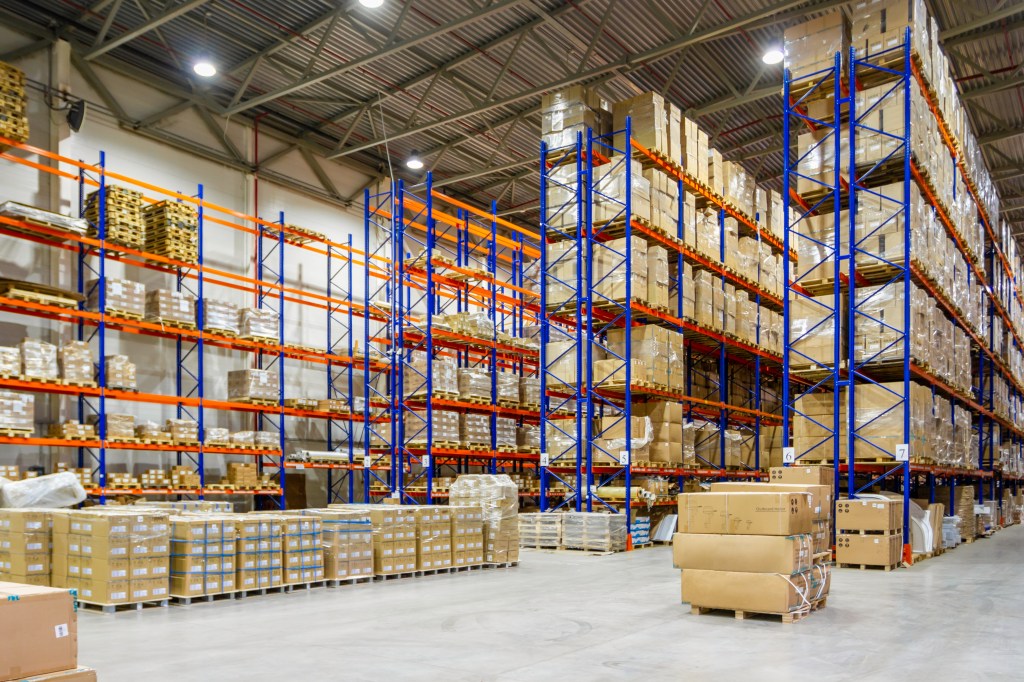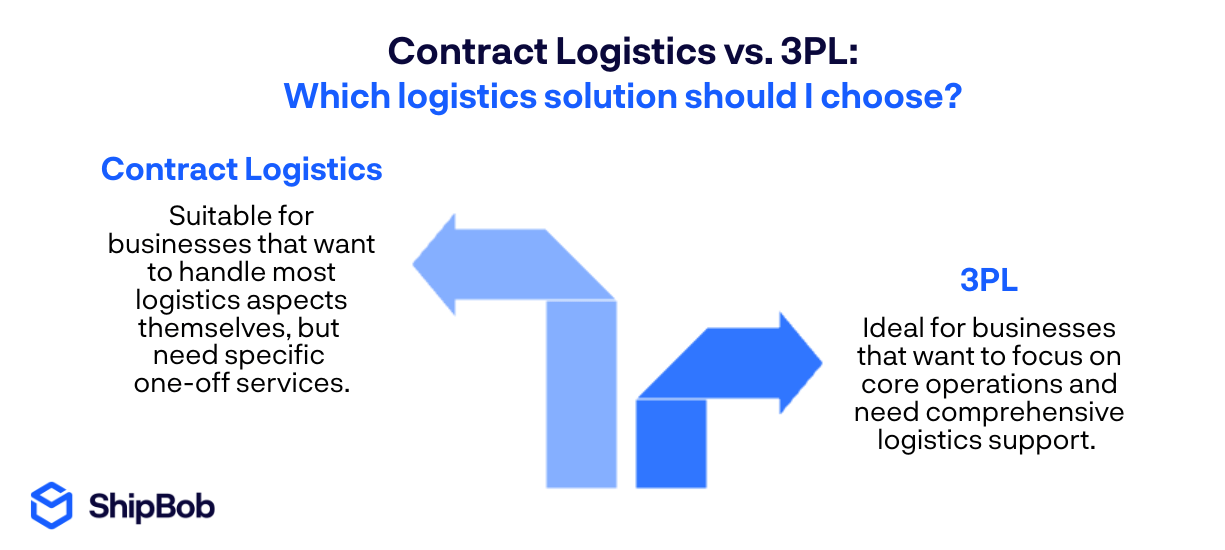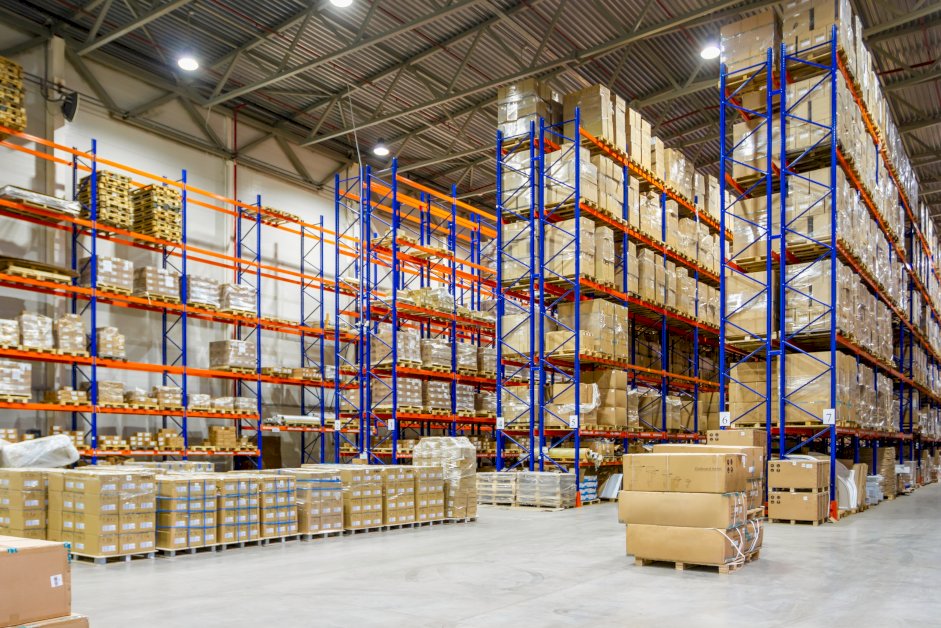Verified & Reviewed
Last updated on August 8, 2025 Written By Meredith Flora

Last updated on August 8, 2025 Written By Meredith Flora
Subscribe for More
Freight forwarders, contract logistics, 3Pls vs 4PLs, lead logistics providers, carrier partners, and so on…
With so many different types of third parties, it can be a challenge to understand the ins and outs of outsourcing logistics.
But if you’re ready to outsource, it’s important to understand the services, capabilities, and roles of different logistics providers, so you can make the right decision on who to partner with.
Contract logistics have evolved rapidly due to the rise of on-demand logistics, but they often get confused with 3PLs that offer a different set of capabilities. While these terms are used interchangeably by some, they can mean completely different things.
In this article, we discuss the differences between the two in detail, and what you need to know before you outsource logistics to a third-party.
What is contract logistics?
Contract logistics involves the strategic outsourcing of specific supply chain functions, such as transportation planning, freight coordination, or delivery management, to external experts like freight forwarders, consultants, or third-party logistics (3PL) providers.
These services usually come with long-term agreements and are meant to help businesses reduce logistics costs, increase operational efficiency, and scale more easily without having to manage supply chain functions in-house
Examples of contract logistics services providers
Contract logistics services are offered by a variety of providers that focus on optimizing different parts of the supply chain.
Here are a few well-known contract logistics providers:
- Expeditors: A global logistics company that offers transportation management, customs brokerage, and supply chain consulting.
- BDP International: Focused on managing complex global supply chains for industries like chemicals and life sciences, BDP provides transportation and compliance services.
- TQL (Total Quality Logistics): One of the largest freight brokerage firms in North America, TQL specializes in arranging truckload, LTL, and intermodal shipping.
- Nolan Transportation Group (NTG): A transportation management company that connects shippers with carriers and handles freight coordination.
How do contract logistics work to benefit businesses?
Contract logistics providers help businesses plan, manage, and execute transportation and delivery strategies, especially for moving goods between manufacturers, distribution centers, and third-party logistics providers.
By working closely with major carriers and freight partners, contract logistics providers can:
- Negotiate more favorable shipping rates due to volume discounts
- Coordinate inbound and outbound freight
- Identify optimized shipping routes and modes of transport
- Reduce delays, costs, and risk across international or domestic shipments
These services are especially useful for ecommerce businesses that import goods, sell internationally, or distribute inventory to multiple fulfillment centers. Contract logistics helps ensure your inventory gets to where it needs to be — even if you’re not handling the final delivery to the customer.
What’s the difference between contract logistics services and 3PL?
What are the differences between a contract logistic company and a 3PL? While While they tend to be confused for one and the same, 3PLs and contract logistics companies may have completely different or even complementary services.
While contract logistics companies typically help arrange transportation and routes, a 3PL company handles much more than just transportation; 3PLs provide a full suite of logistics services, from warehousing and order fulfillment, to inventory management and automated shipping.
Many 3PLs operate multiple distribution locations, so merchants can:
- Split inventory across distribution centers.
- Allocate inventory based on demand
- View inventory on hand in real time.
3PLs are an ideal logistics partner as they provide flexibility and visibility into the ecommerce supply chain, as well as offer technology integrations with ecommerce solutions (from inventory planning to freight shipping), enabling an end-to-end ecommerce solution.
At the same time, a contract logistics company may help manage the transportation to get bulk inventory to a 3PL from a manufacturer, whereas a 3PL typically arranges transportation for orders once they are fulfilled through the carriers directly.
The chart below displays how a 3PL differs from contract logistics, followed by a deeper dive into the different services.
| Service | Contract Logistics | 3PL |
| Inventory management | ❌ | ✅ |
| Delivery management | ✅ | ✅ |
| Warehouse management | ❌ | ✅ |
| Order fulfillment flexibility | ❌ | ✅ |
| Real-time shipment tracking | ❌ | ✅ |
| Tech integration availability | ❌ | ✅ |
1. Inventory management
Compared to contract logistics companies that only specialize in delivery and transportation, a tech-enabled 3PL’s software offers built-in inventory management that makes it easy to track inventory in real time, manage SKUs, and monitor inventory performance over time.
For instance, ShipBob is a 3PL that makes it easy to optimize inventory levels and restock on time by setting up reorder notification points.
By using historical order data to determine SKU velocity, you can forecast demand and have a better understanding on when it will be time to restock inventory.
Having more control over inventory management ensures that you have enough inventory to meet demand while optimizing storage, so you’re less likely to overpay on carrying costs due to deadstock.
“We rely heavily on ShipBob for inventory tracking and forecasting and that’s been a key part of our partnership. Our area of expertise is not logistics or inventory management, so we lean on ShipBob a lot for that. We’ve learned so much about this industry since working with ShipBob, as they are true supply chain experts, which has been good for everyone on our team. When thinking about fulfillment, there’s such a focus on the packing and shipping aspect that the inventory management piece can often go unnoticed. But ShipBob’s ability to help us track and reconcile inventory is really great.“
– Callie Tivnan, E-commerce Manager, and Christina Williams, Customer Success Manager at Barefaced
2. Delivery management
Contract logistics are ideal for overseeing the delivery management processes. However, 3PLs that operate multiple fulfillment center locations can help brands allocate product based on where there is more most demand.
3PLs also partner with major carriers, and even some partner with regional carrier partners to negotiate shipping rates, so they can pass the savings on to you and your customers.
Some fulfillment providers, like ShipBob, use logistics automation to find the most optimized route for shipments and automatically generate order tracking details to share with your customers, so you and your customers can track the last-mile delivery process.
3 Warehouse management
Logistics providers use warehouse management systems (WMS) to ensure inventory is received, stored, picked, packed, shipped, and replenished in the most efficient way possible.
Unlike contract logistics, 3PLs use a WMS not only to streamline and improve internal processes in a fulfillment center, but to also provide merchants with visibility into the fulfillment process.
That way, merchants know which inventory is in transit, what’s on hand, and what items are being fulfilled.
For instance, ShipBob’s proprietary WMS provides visibility into the fulfillment process by allowing merchants to filter orders by status, location, and sales channel.
ShipBob also provides transparency into performance, which offers merchants peace of mind. From the ShipBob dashboard, merchants can view insights on fulfillment speed, order accuracy, shipping, and more.
“Even though ShipBob is fulfilling our orders, I still get visibility into and control of the process with what they’re doing. Wherever I am in the world, I can log in to my ShipBob dashboard and know exactly what’s going on with our orders. ShipBob is dependable, so I can trust that a customer will get their product within two days, even if I’m not in the office or even near the vicinity.”
– Kelly Bond, Operations Manager at Elle Sera
4. Order fulfillment flexibility
Unlike contract logistics, the right 3PL has the systems and processes to provide more flexibility over the retail fulfillment process.
For instance, ShipBob makes it easy for merchants to maintain control with access to a user-friendly dashboard that makes it easy to manage SKUs, create product bundles, manage subscription orders, and oversee B2B ecommerce orders.
“With ShipBob, we were able to mark any combination of SKUs as a unique bundle and select the component SKUs right through the dashboard.
ShipBob also allowed us to make changes to bundles on the fly with complete control and visibility, which is important in monthly subscription boxes, holiday bundles, and many more scenarios.”
Gerard Ecker, Founder & CEO of Ocean & Co.
5. Real-time shipment tracking
These days, customers expect real-time shipment updates on every order placed online. They want to know exactly when their orders is being processed, prepared, shipped, and when it will be delivered.
Partnering with a 3PL can ensure customers will receive order tracking notifications that will provide real-time updates generated by the carrier.
Keeping your customers updated is a great way to ensure satisfaction and retention.
“After switching to ShipBob, we instantly had much more transparency. Unlike our last 3PL, ShipBob has integrity of information and end-to-end order tracking, from receiving to fulfillment to shipping. Now every single day when I check our dashboard, I know exactly what’s happening with our orders.”
– Maria Osorio, Logistics and Operations Director at Oxford Healthspan
6. Tech integration availability
By partnering with a tech-enabled 3PL, you’re given the ability to plug a fulfillment provider’s technology into your existing or growing tech stack.
For instance, ShipBob’s technology integrates directly with all major ecommerce platforms, marketplaces, and solutions. And if your tech stack requires a custom integration, our Developer API allows you to build the solution required for your brand to thrive.
By integrating the leading solutions to ShipBob’s technology, you can easily establish a multichannel retailing and sell on multiple sales channels (including marketplaces like Amazon and Walmart), manage orders more effectively, enhance your returns management process, and more.
“Our business relies heavily on the key integrations between ShipBob, Loop Returns, and Shopify. The direct integration between ShipBob and Shopify is crucial to our success, serving as the primary driver for all our third-party services that depend on up-to-date order data. Additionally, the direct integration with Loop Returns enhances our customer support team’s efficiency and empowers our customers.”
– Sal Perera, Director of Supply Chain at CLEARSTEM
How to choose the right logistics option for your business
With all of this information, how will you know which service is best to choose from? Here is a deeper dive into which logistics option is right for your business.

When it makes sense to use contract logistics
Pending the exact services needed, size of your business, and budget, a contract logistics agreement may be used for the exact stage of the supply chain you need help with, or for one-off services.
It may be worthwhile to utilize a contract logistics company if you are willing to handle everything else yourself – picking and packaging orders, tracking them, keeping track of your own inventory, and maintaining the warehouse.
If you have the time to market your business and handle the logistics when it comes to fulfilling orders, then a contract logistics company is right for you.
When it makes sense to use a 3PL
If you find that most of your time is consumed with running your business and marketing, the best solution for you is to utilize the order fulfillment services of an expert fulfillment provider.
Since 3PLs offer a wide range of solutions to support supply chain efficiency, you can worry less about logistics operations and save time while expanding your supply chain.
Fulfillment partners also provide the necessary infrastructure, technology, expertise, and support you need to stay competitive and meet customer expectations around fast, affordable shipping, which supports your bottom line.
“Expanding our ShipBob warehouse network from 2 to 4 warehouses has translated into substantial cost savings, amounting to $1.5 million in freight expenses for Our Place. Currently, only 2% of our parcels are reaching Zone 7 or Zone 8 collectively, indicating that 98% of our parcels are reaching Zones 1 through 6. By shipping locally to lower zones, we’re achieving the most significant reductions in outbound costs.”
– Ali Shahid, COO of Our Place

Take the complexity out of contract logistics: Partner with ShipBob today
ShipBob is a leading fulfillment solution that operates a global omnifulfillment network.
With ShipBob, online brands have plenty of room for growth with access to a robust fulfillment infrastructure, a team of logistics experts, and a hands-on customer service team.
We also make it easy to get started. Once you’re connected to ShipBob’s technology, you can ship inventory to one or more of our fulfillment center locations.
As soon as orders are placed online, they are automatically sent to the closest fulfillment center location to be picked, packed and shipped.
“As we saw our small startup business beginning to gain traction, we needed to find a 3PL that could help us manage the thousands of orders we would get in minutes.
When I was researching companies, I knew they had to be tech-enabled, integrate with Shopify, and a company that could scale with us. We found exactly that with ShipBob.”
– Jason Ton, CFO of 100 Thieves
To learn more about ShipBob’s premium fulfillment solution, click the button below to get in touch.
Contract logistics FAQs
Here are the top questions around contract logistics and how it differs from a 3PL.
When does it make sense to use contract logistics?
If you are looking for a solution for delivery and transportation, a contract logistic company might be ideal. Contract logistics can help you manage your shipping and potentially give you lower rates, but you still have to oversee fulfillment and inventory management.
Do you save more money with a 3PL or with contract logistics?
In the long run, investing in a 3PL can help you save more money. Not only does it save you time to focus more on your business – whether in marketing or expansion – but it can also save you money that you would have to spend setting up your own infrastructure. It ultimately depends on your needs and the exact services you want to outsource.
How does contract logistics serve the needs of ecommerce businesses?
Contract logistics can help ecommerce businesses manage the flow of inventory before it even reaches a fulfillment center. Whether it’s coordinating inbound freight from manufacturers or optimizing carrier selection for international shipments, contract logistics providers help ensure your products get where they need to go efficiently, so you can focus on selling, not shipping.
How can contract logistics improve supply chain efficiency?
By outsourcing transportation planning, carrier negotiation, and freight coordination, businesses can reduce delays, cut shipping costs, and improve visibility across their supply chain. Contract logistics providers often bring deep carrier relationships and logistics expertise that make a supply chain run smoother.




